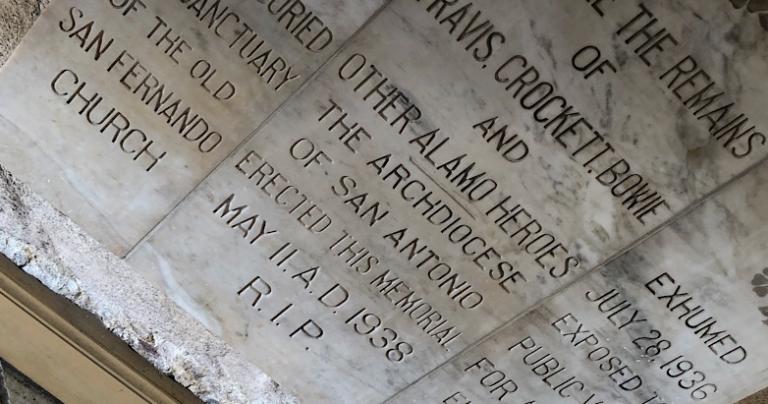 “Never surrender.”
“Never surrender.”
The underrated classic Galaxy Quest gets a laugh from the motto, though the film ends up kind of meaning it. The men at the Alamo truly meant it and Texas was the result. A judicious retreat can be good, ask Sam Houston, who knew how to skedaddle if he must and when it fight when he could. Retreating to fight another day can be brave, but surrender to evil is generally cowardice dressed up as prudence.
The men of the Alamo were not heroes before they refused to surrender. They held to a mix of good and very bad ideas, but when faced with pure tyranny in the form of Santa Anna, they persisted and so were transformed. The bad ideas they had held are forgotten, the good idea, liberty, they loved is remembered. They lost mortal life for immortality.
This is an image of another battle: the search for wisdom.
When you are in a discussion, looking for the truth, sometimes you cannot skedaddle, there is no place to run. The argument has trapped you and you can either die to your false opinions or surrender as a coward. The coward persists in holding to lies and so lives a life. The brave man gives up the lies, finds the truth, and will not move. If he appears to die, this will only be the birth of something immortal. He will die to immediate fame and fortune and live free.
Socrates was a courageous fighter for his city in war and an even braver warrior for justice in peacetime. Plato describes him (Republic) as untiring in the search for truth. He will give up on ideas, sacrifice his opinions, but he will never surrender his quest for wisdom.
Victory or death.
Athens killed Socrates, but his judicial murder made him (like the men of the Alamo) immortal. He died for the right thing and so found life. Most do not choose wisely. In Republic, Socrates meets an older man, a decent person, who does the best he can. He lives what he knows. He has some wisdom, life has given him that. However, this man has opinions that cannot stand scrutiny. When his friend Socrates presses his ideas, they fail. He admits it:
Your questions are to the point, Socrates.
This is the moment for Cephalus. He sees that his old answer has been defeated. He can stay and fight on to see what the truth might be or he can surrender. He will ends up a cowardly cur, surrendering the argument to his son, and experiences no victory, only death. The man who will not persist in reasoning, who will not seek wisdom at any cost, fears the death of his ideas, but makes certain the death of his soul.
 There is no shame in giving up on a bad idea, but eternal disgrace in surrender to a bad idea to avoid continued discussion. Fight on! Cephalus surrenders the argument. He does not retreat to consider other ideas, he quits.
There is no shame in giving up on a bad idea, but eternal disgrace in surrender to a bad idea to avoid continued discussion. Fight on! Cephalus surrenders the argument. He does not retreat to consider other ideas, he quits.
What does it profit a man to surrender in order to avoid losing when he loses his soul in the surrender?
Be an Alamo thinker: victory or death. Never surrender. The result will be a wisdom. All that dies will be bad ideas, the soul that persists is immortal.
———————————————-
*I begin an informal summer reading of Republic using Scott/Sterling (a new translation for me). Part 1. Part 2. Part 3. Part 4. Part 5. Part 6. Part 7. Part 8. Part 9. Part 10. Part 11. Part 12. Part 13.
**I have no idea how much of what I know is just Professor Al Geier filtered through my eccentricity. Here is to you Al!











